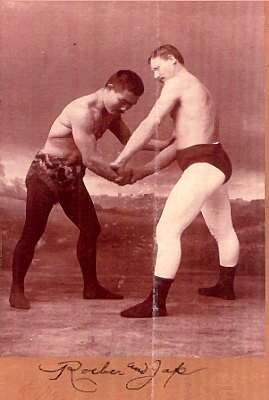Roeber Exposes Business
When World Heavyweight Wrestling Champion William Muldoon retired in 1889, he hoped his protege Ernest Roeber would be recognized as the new champion. However, Muldoon won his title in Greco-Roman wrestling, which was the German-born Roeber’s expertise. Unfortunately, the exploits of Martin “Farmer” Burns and Evan “The Strangler” Lewis catapulted catch-as-catch-can wrestling into the dominant style.
Roeber did have a distinguished career being one of the few wrestlers to have a victory over Yusuf Ismail, the original “Terrible Turk”. Roeber won by disqualification in their first match. In the return match, Roeber wrestled Ismail to a draw.

Sorakichi Matsuda and Ernst Roeber demonstrating wrestling in the late 1880s
By 1901, Roeber was nearing 40 years of age. Close to retirement and noticeably out-of-shape, Roeber took a match on April 29, 1901 against Harry Parker in Parker’s hometown of Boston. Parker was a journeyman wrestler, so Roeber was expected to win the match despite his debilitated condition.
Typical of the time period, the men would wrestle in three different styles for each fall. As an example, one fall would be conducted in Greco-Roman wrestling, one fall would be conducted in catch-as-catch-can and the deciding fall in collar-and-elbow or Cornish wrestling.
The men entered the ring, shook hands and then retired to their corners. After the match started, both men wrestled in a relaxed posture until Parker threw Roeber to the ground at the five minute mark.
Roeber jumped to his feet with a surprised look on his face. He angrily charged at Parker and made a great exertion in trying to get Parker to the ground. However, Parker wrestled defensively in a successful effort to remain on his feet.
After a few minutes, Roeber was completely exhausted. A lack of training and advanced age kept Roeber from making any kind of recovery. He collapsed to the mat and simply defended against Parker’s attempt to pin him until time expired. The referee declared Parker the winner of the match due to his dominance within the time limit.
The referee raised Parker’s hand as an incensed Roeber shouted at his opponent. Roeber furiously approached the reporters at ringside and told them he had been double crossed. A local sports writer named Benton had arranged a meeting between Roeber and Parker. Parker agreed to lose the first and third falls to Roeber. Roeber agreed to drop the second fall. Foolishly, Benton and Parker put the agreement in writing. The reporters were shocked that Roeber would admit the planned faking to them.
Benton, however, could not be found. He may have owned a stake in the promotion because he took the $1,000 purse and left the arena. Roeber’s confession exposed the practice of prearranging outcomes, which sometimes occurred in professional wrestling. Parker’s treachery in double crossing the weak and aging Roeber led to the exposure of this practice in Boston. Professional wrestling did not draw in Boston for sometime afterwards because fans were still turned off by the fixing of matches.
Legitimate wrestling still occurred in 1901 but it was on the way out. Within 15 years, prearranged matches would be the norm. Long, boring matches would be part of the reason. Promoters desire to control championships, and the wrestlers holding them, would be the dominant reason. Great lengths were also taken to hide this fact. Roeber was one of the few, who ever revealed that faking did occur.
You can leave a comment or ask a question about this or any post in the comment section below, on my Facebook page and Twitter profile.
Sources: St. Louis Post-Dispatch, April 8, 1901 edition, p. 8 and April 30, 1901 edition, p. 12.
Pin It
